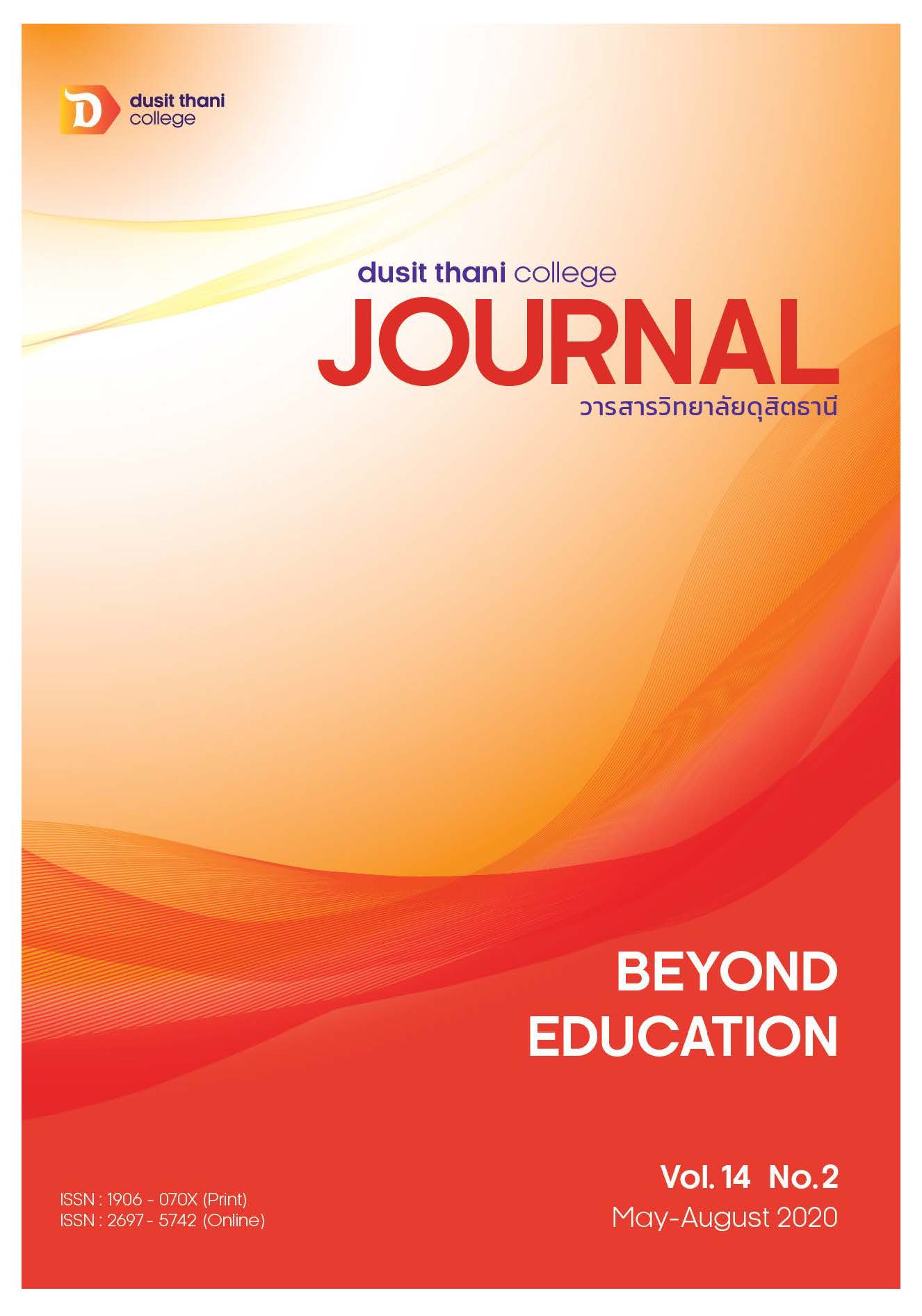การเรียนและการสอนการสื่อสารระหว่างบุคคล: มุมมองของนักศึกษาด้านการบริการ
Main Article Content
บทคัดย่อ
ทักษะการสื่อสารระหว่างบุคคลเป็นหนึ่งในสมรรถนะหลักในงานบริการ อย่างไรก็ตามมีการศึกษาชี้ให้เห็นว่า ผู้สำเร็จการศึกษาด้านการบริการมีทักษะดังกล่าวไม่เพียงพอเมื่อเข้าสู่การทำงานจริง การศึกษาสำรวจวิธีการที่ใช้ในปัจจุบันและปัจจัยที่มีผลต่อการสอนและการเรียนรู้ทักษะการสื่อสารระหว่างบุคคลในกลุ่มนักศึกษาด้านการบริการที่มีคะแนนทักษะการสื่อสารระหว่างบุคคลอยู่ในระดับค่าเฉลี่ย โดยใช้วิธีการวิจัยแบบผสมผสานผ่านการทดสอบออนไลน์และการสนทนากลุ่ม ผลการศึกษาพบว่า บุคลิกภาพและความสามารถของผู้สอน ความน่าเชื่อถือ ทรัพยากร สภาพแวดล้อม ขนาดของชั้นเรียน และระยะเวลาในการเรียนเป็นปัจจัยที่ส่งเสริมการเรียนรู้ทักษะการสื่อสารระหว่างบุคคลผ่านการเรียนรู้เชิงบูรณาการทั้งแบบดั้งเดิมแบบออนไลน์ และแบบผู้เรียนเป็นศูนย์กลาง โดยผลลัพธ์จากการศึกษาครั้งนี้เป็นประโยชน์ต่อการสนับสนุนด้านวิชาการ การเชื่อมโยงกับอุตสาหกรรม การออกแบบหลักสูตร การระบุผลลัพธ์การเรียนรู้ และการฝึกอบรมครู
Article Details
นโยบายการพิจารณากลั่นกรองบทความ
- บทความวิจัยและบทความวิชาการทุกเรื่องที่จะได้รับการตีพิมพ์ต้องผ่านการพิจารณากลั่นกรองโดยผู้ทรงคุณวุฒิ (Peer Review) ในสาขาที่เกี่ยวข้อง จำนวน 3 ท่าน/บทความ
- บทความ ข้อความ ภาพประกอบและตารางประกอบที่ลงตีพิมพ์ในวารสารเป็นความคิดเห็นส่วนตัวของผู้เขียน กองบรรณาธิการไม่จำเป็นต้องเห็นด้วยเสมอไป และไม่มีส่วนรับผิดชอบใด ๆ ถือเป็นความรับผิดชอบของผู้เขียนแต่เพียงผู้เดียว
- บทความที่จะได้รับการตีพิมพ์จะต้องไม่เคยตีพิมพ์ เผยแพร่ที่ใดมาก่อน และไม่อยู่ระหว่างการพิจารณาของวารสารฉบับอื่น หากตรวจสอบพบว่ามีการตีพิมพ์ซ้ำซ้อน ถือเป็นความรับผิดชอบของผู้เขียนแต่เพียงผู้เดียว
- บทความใดที่ผู้อ่านเห็นว่าได้มีการลอกเลียนหรือแอบอ้างโดยปราศจากการอ้างอิง หรือทำให้เข้าใจผิดว่าเป็นผลงานของผู้เขียน กรุณาแจ้งให้กองบรรณาธิการวารสารทราบจะเป็นพระคุณยิ่ง
เอกสารอ้างอิง
Bhinder, H. (2019). Teaching techniques adopted by hospitality faculty members in the classroom. International Journal of Management Studies, 6(1), 70-76. doi:10.18843/ijms/v6il(3)/07
Brownell, J. (1994). Creating strong listening environments: A key hospitality management task. Retrieved from http://scholarship.sha.cornell.edu/articles/1014
Brownell, J. (2009). Fostering service excellence through listening: What hospitality managers need to know. Cornell Hospitality Report, 9(6), 6-18. Retrieved from http://www.chr.cornell.edu
Crawford, A. & Weber, M. (2016). Developing soft skills for future hospitality leaders: A case study. Journal of Hospitality and Tourism Cases, 49-51. Retrieved from https://www.researchgate.net/publication/315445961
Cunningham, S., Bartesaghi, M., Bowman, J., & Bender, J. (2017). Re-writing interpersonal communication: A portfolio-based curriculum for process pedagogy and moving theory into practice. International Journal of Teaching and Learning in Higher Education, 29(2), 381-388. Retrieved from http://www.isetl.org/ijtlhe/
Deale, C. & Jacques, P. (2013). An examination of current hospitality and tourism teaching methods. Journal of Hospitality and Tourism Education, 22(2), 20-29. Retrieved from https://www.researchgate.net/publication/261580788_An_Examination_of_Current_Hospitality_and_Tourism_Teaching_Methods
Grobelna, A. (2015). Intercultural challenges facing the hospitality industry. Implications for education and hospitality management. Journal of Intercultural Management, 7(3), 101-117. doi: 10.1515/joim-2015-0023
Kapoor, S. & de Villa-Lopez, B. (2015). Developing teamwork skills in hospitality management college students. Journal of Tourism Research, 10, 10-24. Retrieved from http://jotr.eu/pdf_files/V10.pdf
Koroglu, O. & Koroglu, A. (2012). The importance of using the emotional intelligence skills for tour guides and their performance. Management and Education, 8(3). Retrieved from http://conference-burgas.com/maevolumes/vol8/BOOK%203/b3_04.pdf
Liasidou, S. (2016). Learning and teaching in Hotel Management Studies: Defining students’ experience. International Journal of Humanities and Social Science, 6(11), 118-128. Retrieved from https://www.ijhssnet.com/journals/Vol_6_No_11_November_2016/14.pdf
Lolli, J. (2012). Interpersonal communication skills and the young hospitality leader: Are they prepared? [Abstract]. International Journal of Hospitality Management, 295-298. Retrieved from https://www.researchgate.net/publication/272590009
Lolli, J. (2013). Perceptions of the importance and preparedness of interpersonal communication skills the entry-level hospitality leader. [Abstract]. Journal of Teaching in Travel & Tourism,13(4). doi:10.1080/1521220.2013.839302
Loreto, M. (2018). Outcomes-based teaching and learning practices in the hotel and resort management program of Dusit Thani College. Dusit Thani College Journal, 12(Special), 82-98. Retrieved from https://so01.tci-thaijo.org/index.php/journaldtc/article/view/129493
Loreto, M. (2019). The influence of social media exposure on the interpersonal communication skills of hospitality students. Journal of Social Science and Humanities (Graduate School) Ramkhamhaeng University, 4(1), 1-20.
Marshall, S. & Cullen, R. (2003). Teaching interpersonal communication skills with digital video. In G. Crisp, D. Thiele, I. Scholten, S. Barker and J. Baron (Eds), Interact, Integrate, Impact: Proceedings of the 20th Annual Conference of the Australasian Society for Computers in Learning in Tertiary Education. Adelaide, 7-10 December 2003.
Mathis, W. (2016). The effectiveness in class size reduction. Retrieved from https://nepc.colorado.edu
Mohammad, S.F., Osman, M. N., & Ishak, F. A. (2018). Exploring the competencies perceived by the hospitality undergraduates in public and private universities. International Journal of Academic Research in Business and Social Sciences, 8(15), 331-349. doi: 10.6007/IJARBSS/v8-i15/5110
Nguyen, Q., Ladkin, A., & Osman, H. (n.d.). Emotional Intelligence and Hotel Employees in Vietnam. Retrieved from http://eprints.bournemouth.ac.uk/23968/3/CHME%20paper_Nguyen%20et%20al%20203020032016-1.pdf
Plangpamool, S. (n.d.). Human capital and interpersonal communication: A successful factor in the hospitality industry. Retrieved from http://www.conference.phuket.psu.ac.th/conference2012/proceedings/pdf/o_FHT%2033.pdf
Rahim, S. & Tazijan, F. (2011). Analyzing the training and internship needs assessment of verbal communication Skills amongst hotel practitioners. English Language Teaching, 4(3). http://dx.doi.org/10.5539/elt.v4n3p44
Salvador, M. & Awat, E. (2013). Factors affecting the learning behaviors of students. Retrieved from https://www.academia.edu/1808454
Sarkar, N., Ford, W. & Manzo, C. (2017). Engaging digital natives through social learning. Systemics, Cybernetics and Informatics, 15(2). Retrieved from http://www.iiisci.org
Sisson, L. & Adams, A. (2013). Essential hospitality management competencies: the importance of soft skills. [Abstract]. Journal of Hospitality & Tourism Education, 25(3). doi: 10.1080/10963758.2013.826975
Tran, T. (2013). Factors affecting teaching and learning English in Vietnamese universities.
The Internet Journal Language, Culture, and Society, 38, 138-145. Retrieved from https://www.researchgate.net/publication/277719144
Interpersonal Skills Assessment. Retrieved from https://www.skillsyouneed.com


